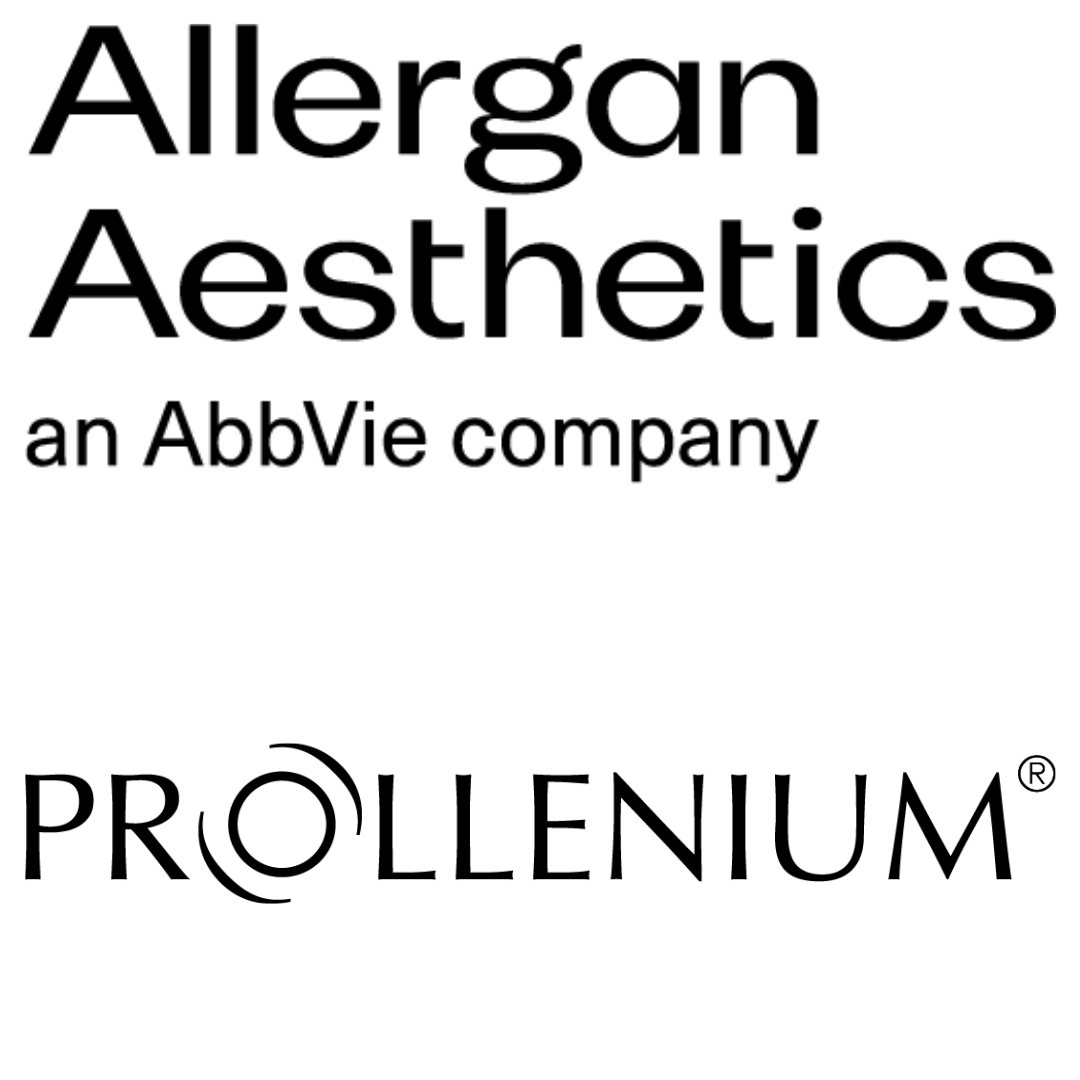Aesthetics Licensing Scheme Key Proposals, Explained

Understandably, everyone has questions about the government’s new aesthetics licensing scheme proposals for England.
In order to gain some clarity our founder and CEO, Dr Tristan Mehta held a 45-minute live discussion with Professor David Sines, CBE on Comma.
Prof Sines is a long-time campaigner for patient safety in the field of non-surgical cosmetic procedures. In addition to being Chair of the Joint Council of Cosmetic Practitioners (JCCP), he is also Harley Academy’s Licensing Advisor.
For those of you who couldn’t join us, here’s a rundown of the evening’s highlights and the full-length video recording. Scroll down to catch up on the insights that were shared as the pair answer questions from medical aesthetics practitioners of varying experience levels.
First of a number of consultations on the aesthetics licensing scheme
“The government published its first consultation paper,” says Professor Sines of the document released by the Department of Health & Social Care (DHSC) on 2nd September 2023.
“There will be others to follow,” he confirms. “This first one was the result of significant engagement led by the former Secretary of State, Maria Caulfield, who we’ve engaged with throughout this journey. Very committed government, cross-party, which is crucial.”
“Having consulted with many people, the JCCP produced three papers in March this year , with the intention of informing the regulatory team at the DHSC of the types of procedures we believe should be regulated as part of a licence. We knew that would be the first consultation. What it said was, ‘We are minded to introduce a proportionately-assessed risk focus on the procedures, a stratified system of risk, for the procedures we have so far been advised should be within the scope of this new practitioner licence’.
“Remember, there’ll be two licences,” David states. “One for the premises from which you work and one for the practitioner. That licence will require a practitioner who provides procedures that will be within the scope of the licence to hold a practitioner licence. It will have to be evidenced by achievement and alignment to competencies and standards yet to be defined. Consultation 2, I guess, next year.”
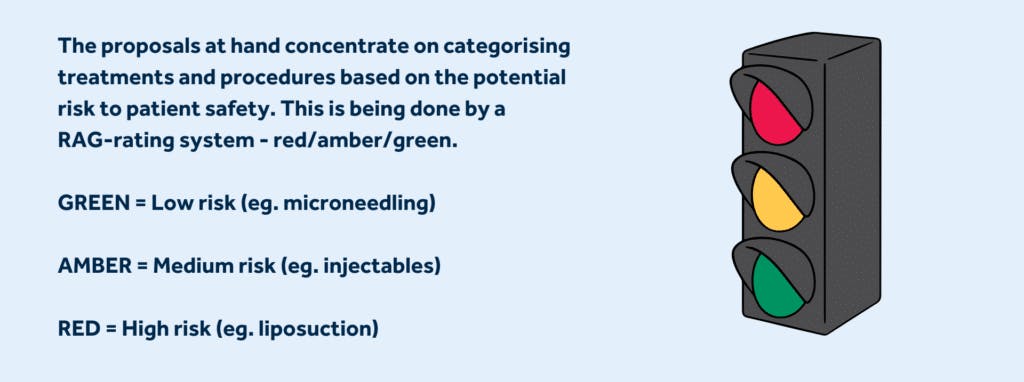
Initial focus is on categorising procedures by risk
Everyone is eager to hear about what qualifications aesthetics practitioners will need to be able to get their licence to practice, but this is not the focus of the first consultation.
The proposals at hand concentrate on categorising treatments and procedures based on the potential risk to patient safety. This is being done by a RAG-rating system – red/amber/green.
Professor Sines highly recommends reading the consultation paper to familiarise yourself with the proposals.
Green procedures
“When you look at the document it’s an easy read,” he says. “It reminds you of the role of the CQC and what it says is, ‘We have agreed as a government of the moment to propose three stratified sections to our proposal. We’re calling them green, amber and red. So the procedures that we perceive at this stage to provide or present minimal risk or minor risk to the public are green. Those procedures which are listed should be provided by a person who holds a licence but they will not be required to have any form of supervision for the green procedures’.”
Amber procedures
“Then we move to the more challenging part,” notes David. “There’s a long list of amber procedures where there is perceived and evidence-based moderate harm if performed in a non-proficient manner.”
Amber is the category comprising treatments such as botulinum toxin, dermal fillers, laser treatments and some chemical peels.
Professor Sines quotes, “What it says is, ‘these procedures should only be performed only by persons who hold a licence but who are under the supervision of a regulated or registered healthcare professional’.”
“The big question is what does supervision and oversight mean? We have to define that together. It’s not a slippery question, it’s one that needs very careful consideration.”
Red procedures
Prof Sines proceeds, “Then the reds are those that are actually associated with high risk. These are the things that have caused us major concern which currently, again, are freely available to offer on the high street. You’ll be amazed when you read the list. Read it, own it, accept it, believe it. It’s real. We’re talking here about liposuction, we’re talking about breast and buttock augmentation, we’re talking about hair restoration surgery, cogs, threads – I could go on.”
“The recommendation here is that those procedures should be regulated by the CQC in future and that they should be restricted only to registered, regulated healthcare practitioners to perform.”
Aesthetics licensing proposals’ definition of ‘supervision’ for non-medics
“In the amber category, one of the most contentious points will be, will non-medical injectors still be able to practice?”, Dr Tristan tells Prof Sines.
“I think you’ve answered that with the idea that if they do, first of all they’d need a certain standard of education and premises. But secondly, they’d be working under supervision”
He stresses, “That definition of supervision is really important to define. It’s the closest we’ve got to having a more medicalised practice for injectables. We can see that as a definite step in the right direction.”
He further advises, “So many of you have asked the question about supervision – is it going to be remote? Is it going to be face-to-face? The answer is, I don’t know that yet… Please make sure you put that into the consultation paper. It’s so important. There will be working groups to start asking the question on supervision against each of the procedures that are absolutely, definitively in the amber category.”
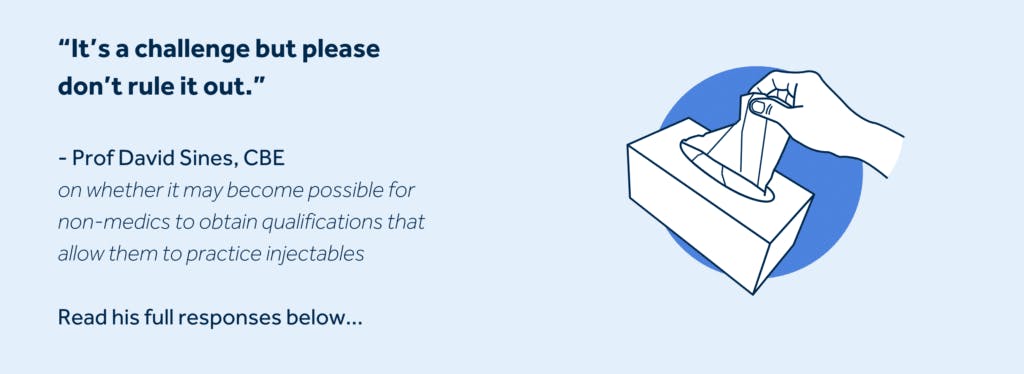
Will non-medics be able to do a qualification that allows them to practice injectables?
Dr Tristan highlighted “concerns that a beautician or a non-medical professional might find a pathway to carry out injectables. How might that be possible when currently no high-quality education institutions would train them?”
Prof Sines concurred that in his JCCP role, he’s “often asked ‘Why can’t I come onto a course?’. We don’t have any courses because we have not yet had that opportunity but there are other routes. We’re in a world now where apprenticeships are possible, so once the new standard is set by the government, there is no reason why apprenticeships can’t be developed up to Level 7. That’s true of any profession – I’m not talking about aesthetics, I’m talking about any profession. So it’s a future model.”
Challenge of ensuring opportunity for progression
He continues, “At the moment we will never accept anyone onto one of our approved programmes for Level 7 Injectables because we do not have the evidence of those providers being in place. We’ve never ever awarded or approved a programme for this level, but there will have to be a whole resurgence of new providers coming on board who will have to meet the standard.”
“It’s going to be a challenge but please don’t rule it out,” he counsels. “I’ll give you a quick example, Birmingham City University College provides a Level 6 degree in aesthetics. It doesn’t meet our standards but it wouldn’t be difficult for that programme to integrate standards, for example. It’s just an example, it’s a university-approved provider, there are others too. We’re not there by any means but there’s a big job of work to do because we’ve got to level this. The government will say, you’ve got to have opportunity for progression if we’re going to introduce this licence. It can’t just be blocked. It’s an important challenge.”
What qualification will medical aesthetics practitioners need to administer botox and fillers?
“I’ve been very interested in the education side from the very beginning,” says Dr Tristan. “A mandatory licence for education standards is an excellent step in the right direction. It’s very important to make a very definitive statement here: we still don’t know what that standard will be. A lot of people want the question answered, ‘Will this particular course meet that standard?’ or ‘Will I need this certain qualification?’ The answer is, we just don’t know.”
”At the moment there’s no mandatory education and training standard,” Professor Sines confirms. “What is formally recognised but not mandated are the HEE standards, which the Department of Health owned at that time.”
“When those standards were produced, at that time the number of procedures being performed were not all identified within the scope of that exercise. So the first thing I would say is that there will be a need for new standards for some of the procedures for which standards do not currently exist.”
Using the Health Education England (HEE) standards as a guideline
“We’ve got HEE standards,” Prof Sines reminds us. These are the standards to which the Level 7 in Injectables is mapped.
“They are still proven to be fit for purpose but they will need to be radically reviewed,” he says. “It has to be a review of the JCCP and CPSA standards which absorbed the HEE standards in 2018. Again, not a legally enforceable standard, but one that I think one would not be sensible to throw the baby out with the bath water, to coin a phrase. I think that’s a common feeling that it needs to start with what’s there and then review. We don’t know if that’s what the government wishes to do, but pragmatically it’s got to be a starting point. But who would say that? Well, the professional regulators might say that; the professional associations, the medical associations would say that.”
“What do I think will happen?” He opines, “I think there’ll be a further mapping of those standards against the scope of procedures that will be in the licence. That has to happen. There needs to be a gap analysis of the current framework to see if we would wish to enhance and strengthen the competencies, as well. And that piece of work is yet to be defined, commissioned and determined who will actually provide it.”
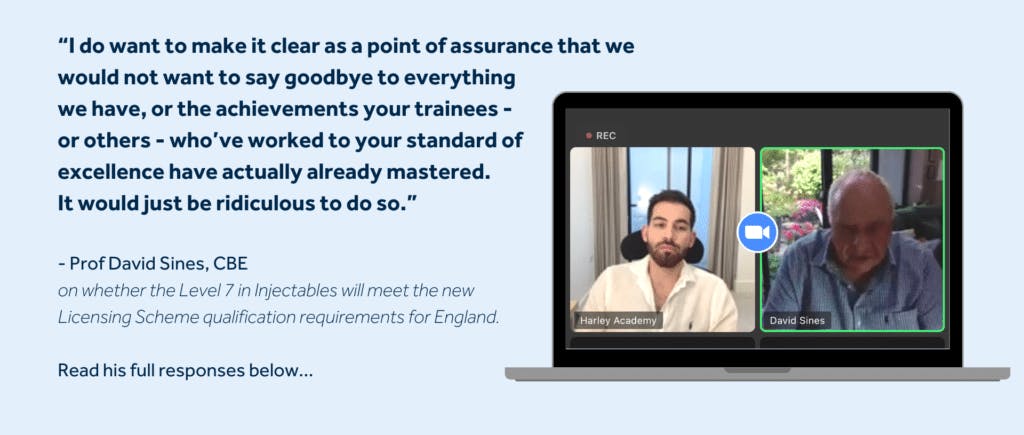
Will the Level 7 in Injectables meet the necessary aesthetics licensing criteria?
“So, the million dollar question,” states Professor Sines. “What about organisations, providers such as Harley Academy, who are currently running JCCP and Ofqual-approved programmes for injectables?”
“The answer is, we can’t give you a definite answer but common sense says that those current programmes would have to be mapped against any new standard and there should be an opportunity for those qualifications to be rolled forward as, potentially, there may be some additional learning or a module or two to be added. Again, I’m speaking very broadly as I don’t know yet what the government’s view would be.”
“However, I do want to make it clear as a point of assurance that we would not want to say goodbye to everything we have, or the achievements your trainees – or others – who’ve worked to your standard of excellence have actually already mastered. It would just be ridiculous to do so.”
Is now a good time to start a Level 7 in aesthetics to be eligible for the new licence?
Dr Tristan summarised many of the questions in the session’s chat function. “As someone who’s considering training in injectables, should they sign up for a Level 7 or should they wait until they’ve made up their minds on what’s needed?”
“That’s a very difficult one for me because obviously I’m very clear in my view,” says Professor Sines.
“I get this question every day. My advice is always, until we know what the standard is, I cannot give you a definitive answer.”
“What I can say is, if you are starting your journey at a postgraduate level from undergraduate practice, I would advise you to certainly consider starting your journey with an approved, accredited provider. Because, as I said already, all of the standards that are being provided by those accredited or approved providers meet the HEE and JCCP standards.”
Will aesthetics practitioners who have already achieved a Level 7 need to do extra training to meet the licensing requirements?
Dr Tristan poses a scenario based on questions coming through from the audience… “Say a doctor or nurse does a Level 7 qualification from a JCCP-approved training provider, and they get their qualification. Given we’ve established we don’t know what this future standard will be, what does this process look like in your mind for making sure in the future that they might.”
Prof Sines responds, “We will have to map the JCCP standards, that you already possess in terms of the proficiency outcomes, with your course provider against the new standard.”
“I hope we’re going to be very involved in helping to set that new standard along with many other colleagues as well. So we’re not going to be in any way diluting the new standard to make it fit our current. Let’s be clear about that.
Identifying any gap between the current and new education requirements
“What I will be doing with colleagues is identifying the gap between the current and the new and, if it is required, then we would identify some collective modules of learning that will be required for top-ups.”
“I can also tell you – don’t hold me to this,” he says. “I believe you might be given up to two years to demonstrate your full compliance with the new standard. Which means top-up as part of a CPD journey, bolt that on through an assessed outcome to your initial, current qualification, then I think you’ll be fit for purpose as part of the licence. I can’t believe it would go any other way, to be frank.”
Dr Tristan agrees, “I’m with you, David. This standard will exist at a higher postgraduate level, we believe, with a defined curriculum that we have already seen the first versions of from Health Education England, we believe. And then if individuals decide to get a qualification now, there will be a potential gap and that gap will be, we believe, a relatively small gap that then will be eligible for the licence. And that’s the expected pathway in your mind.”
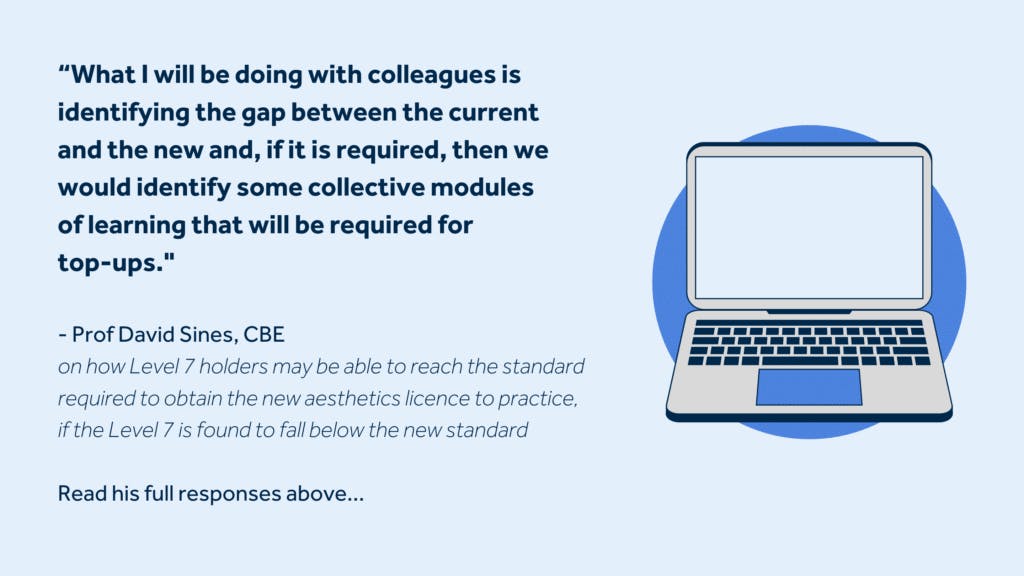
Will the new aesthetics licensing scheme be an extra burden on medical professionals?
Dr Tristan voiced a concern based on the viewers’ feedback. “We have a lot of medical professionals on the call who, in their mind, have jumped through all the right hoops, trained properly, and this licence – unless it truly restricts practice within the medical field – could feel like a little bit of an additional burden. An additional form of regulation on already highly-regulated professionals. What could you say to those practitioners to explain the situation and potentially reassure them?”
“First of all, I’ll tell you that the professional regulators are very supportive of the licence. It’s a very obvious answer but it’s a very important answer,” responds Professor Sines.
Demonstrating your specialism
“Let me give you a quick example” he says. “Many of you will be doctors… If you were working in, say, actual cosmetic surgery… The issue would be that if you are working as a doctor in plastic surgery you might very soon find that you may be subjected to a credentialing exercise against a national standard for plastic surgery. That’s something the GMC are exploring, it’s not agreed. The Royal College of Surgeons is very involved, I’m meeting them again next week.”
“What do I see? I see the new standard being equivalent to a credentialing standard that could well be linked to a medical appraisal in terms of the work you do every year to demonstrate your fitness to practice, your CPD update. So I’m trying to avoid duplication here, of effort, but I do think it’s critically important.”
“You cannot have it both ways,” he stresses. “If you’ve qualified as a doctor, you’ve completed your FY years and you’re now moving into your specialist training, then there is no destination for you yet in aesthetic practice itself, you’ll be in general practice. But my view is that this will demonstrate the postgraduate level of achievement, a requirement that you need to demonstrate your specialism as aesthetics specialist doctors. And I think that’s really important.”
Setting minimum standards for education and medical aesthetics training
“When it comes to the practice of injectables, this is a field to itself and it warrants higher education – its own curriculum,” says Dr Tristan.
“A lot of the time we talk about how would this curriculum be delivered. In the UK, we don’t see that there will be an NHS specialty training programme for aesthetic medicine, right? And so it’s under whose jurisdiction? Will that be Ofqual? Will that be under another awarding authority?”
“How do you see that being awarded?” he asked, in relation to the aesthetics licensing proposals.
No answer yet, but…
”There are some questions there that we do not have answers to,” responds Prof Sines. “But remember this please, everybody… The scheme itself for licensing will be administered by local authority environmental health teams. They do not set the standards, they ensure it’s enforced. Therefore, they’re going to need to turn to an explicitly defined handbook of operational procedures to confirm which qualifications will meet the new standard and what other alternative routes are available to demonstrate equivalence to that standard.”
He continues, “The answer to your question is, if it’s a qualification, I feel very sure it will have to be awarded either by a university or by an Ofqual-regulated awarding body as a qualification. I’m going to call this new standard an ‘industry standard’, for a moment. It’s a working definition that says if the Department of Health and Social Care mandates that standard, then someone has to oversee it.”
Policing the aesthetic medicine training providers
“Then we get to the point of who will then quality assure the education providers who provide the actual Ofqual, industry standard, approved qualifications via the awarding bodies,” says David.
“I would like to see a regulator of some description holding a register of all of those approved education and training providers, so that when you present your certificate or evidence of completion of a programme, it can be checked against a list of approved providers. And that’s what the environmental health offices will probably need. Who will perform that function? I don’t know, I have ideas but I think it’s something we have to think about, but it’s a real question that has to be solved.”
Minimum age limit to be introduced for all aesthetic treatments
“Finally,” outlines Professor Sines, “there’s an age restriction proposed that all of the procedures in the licence should be performed for people over the age of 18 years unless there is a very clear, explicitly defined, medical reason or rationale.”
Dr Tristan agrees that having this minimum age restriction as part of the aesthetics licensing proposals is an “absolutely essential move in the direction of safety”.
When will we know more about the next stage of the aesthetics licensing scheme proposals?
Professor Sines notes, “This consultation ends on 28th October, so there won’t be radio silence… I urge you all to present your own responses collectively or individually. That consultation will have to be reviewed and the outcomes considered, probably next January we’ll have a very clear view of the procedures.”
He concludes, “You’ll then hear, I’m sure by February time, what the process will be for the standard setting for the education and training approach. Bear in mind, all of this has to be in place for early 2026, I think. But, believe me, I thought ‘How can it take so long?’ – I think we’re going to need that time to get it right.”
If you’d like to speak to our Courses team about what the aesthetics licensing scheme could mean for you, get in touch now. Our helpful advisors will answer your questions about the proposed legislation. They can also recommend your best aesthetics training course pathways, should you wish to explore Ofqual-regulated qualification options.










